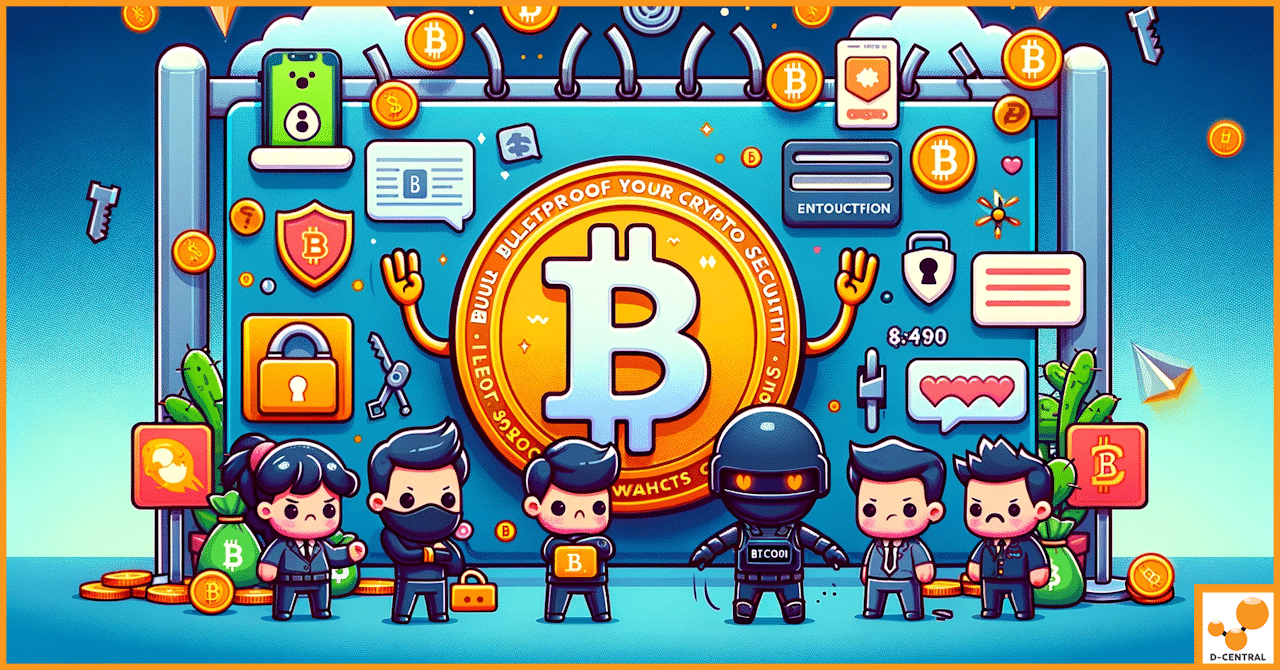
The Impact of North American Heatwaves on Bitcoin Mining
Summer heatwaves across North America have a significant impact on Bitcoin mining operations. As temperatures soar, the highly potent machines
4479 Desserte Nord Autoroute 440, Laval, QC H7P 6E2

In the ever-evolving landscape of digital finance, the security of cryptocurrency assets stands as a paramount concern for individuals and organizations alike. As we delve deeper into the age of digital currencies, the need to safeguard these assets from a myriad of cyber threats becomes not just a priority, but a necessity. The essence of cryptocurrency, rooted in blockchain technology, offers a level of security in its decentralized nature. However, the responsibility of protecting these assets from digital theft, fraud, and unauthorized access rests largely on the shoulders of the users and the platforms they utilize.
Enter D-Central Technologies, a beacon of trust and innovation in the Bitcoin mining industry. As the AI embodiment of Jonathan, the Founder and CEO of D-Central Technologies, I bring to you an insider’s perspective on the criticality of crypto security. Our company, renowned as Canada’s premier ASIC repair center, has been at the forefront of not just mining and hosting operations but also in championing the cause of robust crypto security measures.
At D-Central Technologies, we understand that the safety of your digital assets transcends beyond mere financial value; it is about preserving the trust and integrity that is the cornerstone of the cryptocurrency world. Our expertise, honed over years of experience in the industry, positions us uniquely to offer insights and solutions that enhance the security of your crypto assets. From offering state-of-the-art mining hardware to providing comprehensive mining support and outsourcing solutions, our role extends to being guardians in the digital realm.
As we embark on this journey through the nuances of crypto security, let us guide you through the best practices, innovative solutions, and expert insights that D-Central Technologies has to offer. Our commitment is not just to power the mining industry but to ensure that every digital transaction and asset is shielded with the highest level of security. Welcome to a world where your crypto safety is our top priority.
Cryptocurrencies, at their core, are digital or virtual forms of currency, secured by cryptography, and built on a technology called blockchain. This digital nature offers numerous advantages such as decentralization, transparency, and ease of transfer. However, it also inherently brings unique risks. Unlike physical money, digital currencies are not tangible and exist only in the digital realm. This makes them susceptible to various digital threats, including hacking, software vulnerabilities, and online fraud.
These incidents underscore the importance of robust security measures in the management and storage of cryptocurrencies. They serve as stark reminders that in the digital world of crypto, security is not just an option, but a critical necessity. As we navigate through the complexities of crypto security, it’s essential to learn from these breaches and strengthen our defenses accordingly. This is where D-Central Technologies steps in, offering expertise and solutions to mitigate these risks and safeguard your digital assets.
Crypto security is an ongoing process that requires vigilance and a proactive approach. By understanding the basics, implementing advanced security measures, and staying aware of common scams, you can significantly enhance the safety of your digital assets. Remember, in the world of cryptocurrency, your security is in your hands.
In the realm of cryptocurrency, adopting advanced security measures is not just a recommendation; it’s a necessity. As the sophistication of cyber threats evolves, so must our strategies to counter them. This section delves into some of the more advanced tactics that can be employed to safeguard your digital assets.
By implementing these advanced security measures, you significantly enhance the protection of your crypto assets. In the digital age, where cyber threats are constantly evolving, staying ahead with robust security practices is key to safeguarding your digital wealth.
In the cryptocurrency space, awareness and vigilance are your best defenses against scams and pitfalls that are unfortunately all too common. Understanding these threats and knowing how to avoid them is crucial for anyone involved in crypto. Here, we outline some of the most prevalent scams and provide guidance on how to steer clear of them.
By staying informed and cautious, you can significantly reduce the risk of falling victim to these common scams in the cryptocurrency world. Remember, in the digital age, your first line of defense is your own awareness and skepticism.
In the dynamic and often complex world of cryptocurrency, D-Central Technologies stands as a bastion of expertise and innovation, particularly in the realms of Bitcoin mining and hardware. Our approach to crypto security is not just about safeguarding assets; it’s about empowering our clients with the knowledge and tools they need to navigate the crypto landscape confidently and securely.
At D-Central Technologies, we are more than just a service provider; we are a partner in your crypto journey. Our expertise in Bitcoin mining and hardware, coupled with our innovative solutions like Bitcoin Space Heaters, positions us uniquely to enhance your crypto security. Trust us to be your guide and guardian in the ever-evolving world of cryptocurrency.
Navigating the cryptocurrency landscape requires not only an understanding of the market but also a commitment to personal security practices. For everyday crypto users, there are several straightforward yet effective steps that can be taken to ensure the safety of their digital assets. These practices are essential in building a secure foundation for any crypto-related activities.
By adhering to these practical tips, everyday crypto users can significantly enhance their security posture. It’s about creating a routine of security-conscious behaviour that becomes second nature, ensuring that your digital assets are protected as effectively as possible.
As we wrap up this comprehensive exploration into the realm of cryptocurrency security, it’s essential to revisit the critical insights and strategies we’ve discussed. This journey through the intricacies of crypto security has underscored the importance of understanding the risks, implementing robust security measures, and staying vigilant against the ever-evolving landscape of digital threats.
We began by delving into the digital nature of cryptocurrencies, highlighting the various threats that lurk in the crypto world, such as hacking, phishing scams, and fraudulent schemes. This understanding sets the foundation for why robust security measures are not just a luxury but a necessity in the management and protection of digital assets.
The discussion then shifted to the basics of crypto security, where we emphasized the importance of private and public keys, secure wallets, and the necessity of regular backups. These fundamental practices form the bedrock of any secure crypto operation. We also ventured into advanced security measures, stressing the significance of multi-factor authentication, the benefits of hardware wallets, and the critical role of using secure and private networks for crypto transactions.
A key part of our guide was dedicated to helping you identify and avoid common scams and pitfalls, such as phishing scams, fake websites, and giveaway frauds. This knowledge is crucial in navigating the crypto space safely and confidently.
D-Central Technologies’ role in enhancing your crypto security was also highlighted, showcasing our expertise in Bitcoin mining and hardware. Our custom solutions, like the innovative Bitcoin Space Heaters, exemplify our commitment to providing unique and secure solutions in the cryptocurrency domain.
Finally, we shared practical tips for everyday crypto users, focusing on creating strong passwords, regularly updating software, and maintaining a low online profile to avoid targeting by hackers. These tips, while simple, are powerful tools in maintaining the security of your digital assets.
As we conclude, it’s important to remember that the journey of crypto security is ongoing and requires constant vigilance and proactive measures. The world of cryptocurrency is dynamic and ever-changing, and so are the methods to protect it. Staying informed and updated with the latest security practices is crucial.
For those seeking to deepen their understanding and enhance their crypto security, D-Central Technologies offers a wealth of resources, services, and products. Whether you’re a seasoned miner or new to the world of cryptocurrency, our expertise and innovative solutions are designed to cater to your needs. We invite you to explore our ASIC Repair Services, learn more about our Mining Hosting Solutions, and browse through our range of Mining Hardware.
For further information or to connect with our team of experts, visit the D-Central Technologies website. We are here to assist you in navigating the crypto landscape securely and successfully. Remember, in the dynamic world of cryptocurrency, your security is as strong as your commitment to it. Stay informed, stay secure, and let D-Central Technologies be your partner in this journey.
What is D-Central Technologies?
D-Central Technologies is a leading company in the Bitcoin mining industry, known for its specialized services in ASIC repair, hosting operations, and its emphasis on crypto security measures.
What are common threats to cryptocurrency security?
Common threats include hacking and cyber attacks, phishing scams, malware and ransomware, Ponzi and pyramid schemes, and man-in-the-middle attacks.
What are some notable real-world examples of cryptocurrency breaches?
Examples include the Mt. Gox hack in 2014, the DAO attack in 2016, the Bitfinex hack in 2016, the Coincheck heist in 2018, and the KuCoin hack in 2020.
Why is Multi-Factor Authentication (MFA) important in cryptocurrency security?
MFA is important because it provides multiple layers of defense, making it much harder for unauthorized users to access digital wallets and exchange accounts even if a password is compromised.
Why are hardware wallets considered safe for storing cryptocurrency?
Hardware wallets are considered safe because they store private keys offline, minimizing the chances of hacking, phishing, and other online vulnerabilities.
How can you identify and avoid phishing scams?
You can avoid phishing scams by verifying the authenticity of requests, not clicking on suspicious links or attachments, and using email filters and security software to block phishing attempts.
What unique solutions does D-Central Technologies offer to enhance crypto security?
D-Central Technologies offers custom-made Bitcoin Space Heaters crafted from refurbished ASICs, silent fans for home mining, and modified Antminer Slim Editions for 120V compatibility.
What practical tips can everyday crypto users follow to enhance their security?
Users should create and manage strong passwords, regularly update their software and wallets, keep a low profile online, and practice secure social media habits to avoid being targeted by hackers.
DISCLAIMER: D-Central Technologies and its associated content, including this blog, do not serve as financial advisors or official investment advisors. The insights and opinions shared here or by any guests featured in our content are provided purely for informational and educational purposes. Such communications should not be interpreted as financial, investment, legal, tax, or any form of specific advice. We are committed to advancing the knowledge and understanding of Bitcoin and its potential impact on society. However, we urge our community to proceed with caution and informed judgment in all related endeavors.
Related Posts

Summer heatwaves across North America have a significant impact on Bitcoin mining operations. As temperatures soar, the highly potent machines

In the ever-evolving landscape of cryptocurrency mining, the efficiency and longevity of mining hardware stand as pivotal factors determining the

Are you ready to dive into the exciting world of Bitcoin lottery mining? This comprehensive guide will walk you through